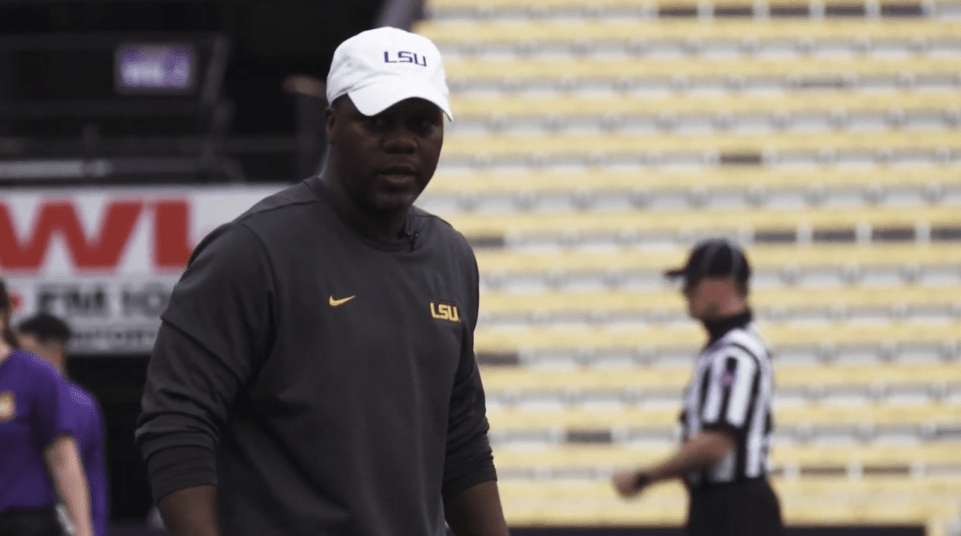
New DC Daronte Jones has prescription for LSU’s defensive ills
Most of LSU’s best football teams over the years have had one primary characteristic in common: They played very good defense.
They have been athletic, deep and tough on that side of the ball. Their identities have generally been linked to a defense that overcame offenses that were less impressive.
Of course, the 2019 LSU offense carried an inconsistent defense to a national championship.
But that was an aberration.
The Tigers want to get back to playing defense that is worthy of their heritage.
When defensive coordinator Dave Aranda left after the championship to become head coach at Baylor, LSU head coach Ed Orgeron turned to a former Tiger assistant as a replacement.
He brought back Bo Pelini, who had been defensive coordinator when LSU won the 2007 national championship, its most recent title before 2019.
The hire didn’t work out. In fact, it was a disaster.
The Tigers had talent on defense, but they were young, inexperienced and lacked dependable depth. Most all, they were befuddled.
They gave up yards in record numbers. Opposing receivers were often uncovered on touchdown plays. Running backs sometimes ran all the way to the end zone – or close to it before they were touched.
After giving up a touchdown, defenders would often look back at teammates and outstretch their arms in a gesture suggesting the teammate didn’t do what they expected him to do.
They would shake their heads and look to the sideline for an answer. They rarely got one that was useful.
Pelini simplified the defense during the season. It made little difference.
The defense had a couple of adequate performances during the second half of the season. But it wasn’t enough to prevent the defending national champions from finishing 5-5, nor was it enough to save Pelini’s job.
Now it’s Daronte Jones’ job to restore LSU’s defense to where LSU defenses are supposed to be – among the best in the SEC if not the country.
Jones’ most recent experience is in the NFL with the Vikings, the Bengals and the Dolphins. He coached with Aranda at Wisconsin, worked at a few other colleges and had a stint in the CFL. He coached at a couple of Louisiana high schools – Jeanerette and Franklin.
He has mostly coached defensive backs, which he will do with the Tigers. LSU likes to called itself “DBU” and Jones has some work to do before that moniker starts to ring less hollow than it did last season.
Orgeron has said during spring practice that the Tigers should be deeper on the defensive line and more physical at linebacker.
Orgeron, a former defensive line coach, said he will be more hands-on in coaching the defense if he feels it’s necessary.
But it’s Jones’ defense – along with new line coach Andre Carter and new linebackers coach Blake Baker – and his approach to defense seems like a sensible prescription for what ailed the Tigers defense last season.
Aranda ran a 3-4 scheme and Orgeron said one of the reasons he hired Pelini was because his 4-3 scheme better fit the team’s personnel. But the defensive front rarely seemed comfortable.
Jones’ assessment of the formation options: “It’s just numbers.”
He added that players come first, the scheme second.
It’s more important to put players in positions where they are comfortable, from which they can “attack, dictate terms, play fast.”
If an edge rusher likes to stand up, let him stand up. If he likes like to put his hand on the ground, let him put his hand in the ground.
LSU has plenty of talented athletes on defense. Always does.
But if those players are uncomfortable, freezing or hesitating, even for just a split second, they’re going to find themselves trying to run down ball carriers in the open field rather than grabbing them before they get started.
That’s what happened too often last season.
Jones wants players focused on doing “one-eleventh” of the defense’s job. That means 11 guys understanding their role in the defense and staying within their jurisdiction because they trust each of their teammates to properly police theirs.
Too often last season, Tigers defenders would freelance, abandoning their turf to try and make a play elsewhere because they didn’t trust a teammate or weren’t clear on the division of responsibilities.
It cost the defense and the team.
Getting to where Jones wants the defense to be will require effective teaching, which Jones noted, requires recognizing that different individuals sometimes best absorb teaching with different approaches.
Jones’ goal is for the players to fully understand the defense, their responsibilities and those of each of their teammates – to feel comfortable and confident enough to use their athleticism and skill at maximum efficiency.
In other words, to play LSU defense the way it used to be played.
